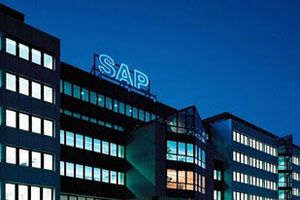SAN FRANCISCO: SAP AG (SAP), Europe's biggest software maker, is celebrating its 40th birthday this week. To stay relevant for the next 40 years, the company is calling on its Silicon Valley venture arm for help.
Backed by $353 million from its parent, SAP Ventures is searching for startups building cloud-computing applications, open-source software and employee-collaboration tools. It led a $50 million investment last week in Violin Memory Inc, a maker of flash memory for data centers, and the firm has previously made profitable bets on LinkedIn Corp and ExactTarget Inc.
 Spun out of SAP as an independent entity in 2011, SAP Ventures is tasked with turning a profit while helping keep its sole investor on top of emerging trends.
Spun out of SAP as an independent entity in 2011, SAP Ventures is tasked with turning a profit while helping keep its sole investor on top of emerging trends.
With $20 billion in sales and more than 55,000 employees, SAP needs help coping with the "innovator's dilemma," a phrase coined by Harvard Business School professor Clayton Christensen in the 1990s that refers to the challenges industry leaders face in spotting disruption before it threatens their business.
"The world will change no matter what happens and you might as well get insight into it," said Nino Marakovic, chief executive officer of SAP Ventures in Palo Alto, California. SAP "has been incredibly forward thinking and supportive of our activities that step on SAP's feet a little bit," he said.
Broader trend
The field of corporate venture capitalists is getting more crowded. They increased their investments by 15 per cent in 2011 to $2.3 billion from $2 billion the previous year, according to a report last month from PricewaterhouseCoopers LLP and the National Venture Capital Association.
Google Inc's venture unit is investing as much as $200 million annually in startups, and Comcast Corp. opened a San Francisco office for its venture division last year. Dell Inc, meanwhile, hired Jim Lussier from Norwest Venture Partners in 2011 to restart a venture business more than a decade after closing it.
SAP Ventures was started in 1997 and until last year operated as the strategic investing unit of its parent in Walldorf, Germany. The division invested in more than 100 companies in those 14 years — including WebEx Communications Inc, now owned by Cisco Systems Inc, and Red Hat Inc.
SAP started SAP Ventures Fund I in January 2011 to give the firm's partners complete control over investment decisions. SAP Ventures invests $3 million to $12 million in each startup and is likely to raise another fund next year of a similar size as the current one, Marakovic said.
Dot-com era
While large enterprises need to invest in innovation, they've had a mixed record as venture capitalists, said Bob Ackerman, the founder of Allegis Capital in San Francisco and a lecturer in venture finance at the University of California at Berkeley.
They tend to come in when there's growth, such as during the dot-com boom of the 1990s, and leave when the market sours, he said. The significance they place on venture capital can also shift when there's a change in management or board of directors.
"I've seen situations where there's a change of CEO and the program abruptly stops," Ackerman said. "For the corporate venture team, that can be very frustrating, but for the portfolio company dependent on those corporate relationships, it can be a disaster."
That's one reason SAP wanted more separation from the venture unit. Now it's just up to the partners to make the right deals — something they've had success at so far. The fund backed business-networking site LinkedIn and e-mail marketing provider ExactTarget (ET), which both went public in the past year.
It also owned a stake in Endeca Technologies Inc., which Oracle Corp bought for more than $1 billion in December, and LogLogic Inc, purchased this week by Tibco Software Inc.
Box, Lithium
SAP Ventures has invested in some of the most high-profile business software startups, including Box Inc, the provider of cloud storage and collaboration, and Lithium Technologies Inc, a social-media marketing company.
In addition to providing a window into Silicon Valley innovation, the investments are part of a plan to help SAP expand beyond traditional business software. The company has stepped up acquisitions to boost its cloud and mobile offerings, purchasing SuccessFactors Inc this year and Sybase Inc in 2010.
Cloud computing allows companies to get their software and processing power delivered over the Internet, freeing them from having to maintain servers themselves.
SAP also is investing in new fields such as in-memory analytics, which allows clients to perform calculations rapidly and directly from large amounts of data.
Dealing with stigma?
Still, some entrepreneurs are concerned about taking money from a potential competitor and other startups prefer to stick with the traditional venture names, such as Sequoia Capital and Accel Partners. That forces SAP Ventures to work harder to reach the hottest companies, said Lithium CEO Rob Tarkoff, who ran Adobe Systems Inc's venture arm before joining the Emeryville, California-based startup.
"They come from this mentality that because they're a corporate venturing arm, people are going to not be as interested in them," Tarkoff said. "They're hustling more because of that."
For Tarkoff, that has included meetings with top SAP executives to gain insight on new products that customers are interested in buying. Jaspersoft Corp. CEO Brian Gentile said his San Francisco-based company, a provider of business intelligence software, has actually won clients because of SAP's support.
"There's comfort in knowing SAP has made an investment and backs this software company that you're considering doing business with," Gentile said. "They're looking for validation and SAP brings some of that."


